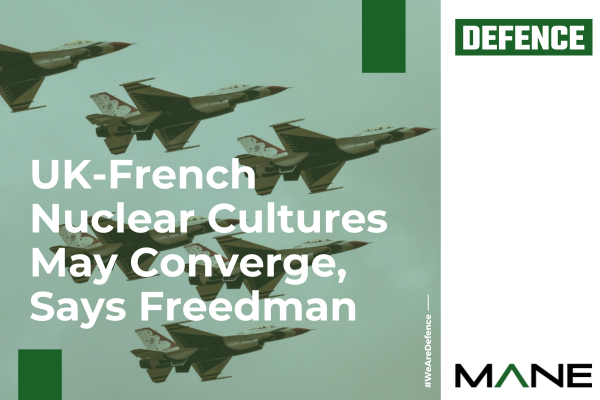UK-French Nuclear Cultures May Converge, Says Freedman
16 Apr, 20252 minsThe United Kingdom and France could be moving towards closer alignment in their nuclear dete...

The United Kingdom and France could be moving towards closer alignment in their nuclear deterrence strategies, according to one of Britain's most distinguished strategic thinkers, Professor Sir Lawrence Freedman.
Historic Divergence in Approach
During a recent Defence Committee evidence session, Freedman highlighted how the two European nuclear powers took markedly different paths following the Suez Crisis of 1956. "We went for interdependence; the French went for independence," he explained, referring to the UK's decision to pursue close nuclear cooperation with the United States while France developed an entirely sovereign capability.
This fundamental difference has shaped both nations' nuclear postures for decades. The UK committed its strategic nuclear force—currently the submarine-based Trident system—to NATO, reserving independent use for exceptional circumstances of national survival. France, meanwhile, maintained a completely autonomous deterrent with a more layered approach, including both submarine-launched ballistic missiles and air-delivered weapons.
Growing Strategic Convergence
Despite these historical differences, Freedman suggested that changing geopolitical circumstances could drive the UK and France towards more similar nuclear thinking. "In these circumstances, you have to be prepared to draw more attention to it. I can see us being closer to the French position," he noted.
Freedman emphasised that despite the technological relationship with the US, "Trident can still be used independently. We do not have to get American permission to use it." However, he acknowledged that the 1958 US-UK Mutual Defence Agreement has "inhibited quite a lot of co-operation in the past on things such as synchronising patrols and discussing common problems" between the UK and France.
Personnel Implications of Closer Cooperation
Any move towards greater UK-French nuclear cooperation would have significant implications for the defence workforce in both countries. Nuclear expertise represents one of the most specialised and sensitive areas of military capability, with highly trained personnel working across submarine operations, weapons engineering, strategic planning, and intelligence assessment.
The development of shared doctrines or potentially complementary capabilities would require new joint training programmes, staff exchanges, and the cultivation of officers with detailed understanding of both nations' nuclear cultures. This would create unique career paths for selected military personnel and defence scientists, while opening opportunities for collaborative research and development work.
Vice Admiral Sir Jeremy Blackham (ret.), former Deputy Chief of the Defence Staff, commented on these potential workforce considerations: "Developing closer nuclear cooperation would demand investment in a cadre of officers and officials with deep expertise in both British and French strategic thinking. This isn't just about technical systems—it's about building mutual understanding of decision-making processes, command structures, and operational concepts."
Strategic Context
The discussion comes against a backdrop of increased nuclear tensions in Europe, with Russia making explicit nuclear threats following its invasion of Ukraine. The upcoming Strategic Defence Review is expected to address the UK's nuclear posture amidst these heightened concerns.
Freedman noted the artificial nature of rigid distinctions between "tactical," "intermediate," and "strategic" nuclear weapons, explaining that Trident already possesses "sub-strategic" capability that could theoretically target military formations—though he described this as "a very expensive and rather brutal way of doing it."
Looking forward, Freedman observed that UK-French cooperation offers significant potential, stating that "Together, [the British and French forces] have quite a significant punch." This assessment reflects growing recognition within Parliament that European nuclear deterrence may need adaptation to respond to both great power competition and nuclear ambiguity on NATO's eastern flank.
As Russia continues to emphasise nuclear capabilities in its military doctrine and questions arise about the long-term reliability of US security guarantees to Europe, the prospect of deeper UK-French nuclear cooperation represents a potential foundation for a more autonomous European deterrent posture—with profound implications for the strategic landscape and the skilled personnel who maintain these capabilities.


